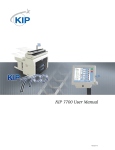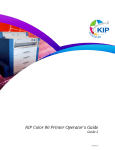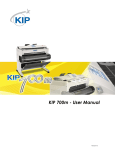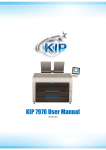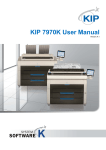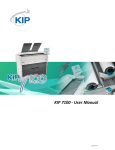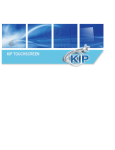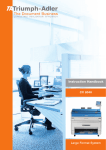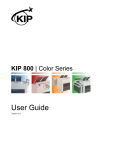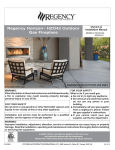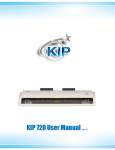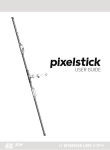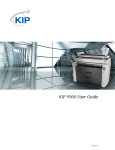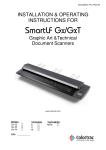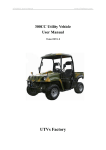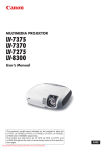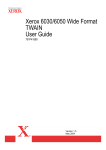Download KIP C7800 User Manual - KIP
Transcript
KIP C7800 User Manual Thank you for purchasing the DIGITAL COLOR PRINTER KIP C7800. This Hardware Operation Guide contains functional and operational explanations for the KIP C7800. Please read this Hardware Operation Guide carefully before using the Printer. Please keep this Hardware Operation Guide for future reference. When this machine is installed in U.S.A. This equipment satisfies the requirements in Part 15 of FCC Rules for a Class A computing device. Operation is subject to the following two conditions: (1) This device may not cause harmful interference. (2) This device must accept any interference received, including interference that may cause undesired operation. When this machine is installed in Europe This equipment satisfies the requirements in Pub.22 of CISPR Rules for a Classic A computing device. Operation of this equipment in a residential area may cause unacceptable interference to radio and TV reception requiring the operator to take whatever steps are necessary to correct the interference. Do not install this machine around electronic equipment or precision instruments. Other devices may be affected by electrical noise during operation. If Machine is installed near other electronic equipment, such as a TV or a radio, interference to said equipment, such as noise or flickering, may occur. Use a separate power line and install the PRINTER as far as possible from said equipment. KIP C7800 is an ENERGY STAR qualified printer. The International ENERGY STAR ® Office Equipment Program is an international program that promotes energy saving through the penetration of energy efficient computers and other office equipment. The program backs the development and dissemination of products with functions that effectively reduce energy consumption. It is an open system in which business proprietors can participate voluntarily. The targeted products are office equipment such as computers, monitors, printers, facsimiles, copiers, scanners, and multifunction devices. Their standards and logos are uniform among participating nations. The symbol shown indicates that this product conforms to Directive 2002/96/EC of the European Parliament and the council of 27 January 2003 on waste electrical and electronic equipment (WEEE) and does not apply to countries outside of EU. The symbol shown indicates that this product conforms to SJ/T11364-2006 of People’s Republic of China Electronic Industry Standard and does not apply to countries outside of People’s Republic of China. The symbol shown indicates that this product conforms to GB 18455-2001 11364-2006 of National Standard of the People’s Republic of China and does not apply to countries outside of People’s Republic of China. (1) Safety Warning The following warnings are very important in order to safely use this product. These notes are important in preventing danger to the operator or operation of the printer. The following symbols are found throughout the USER’S Manual and have the following meaning: WARNING This WARNING mark means that there is a possibility of death or serious injury if you ignore or do not follow the said instruction. CAUTION This CAUTION mark means that there is a possibility of injury or physical damage if you ignore or do not follow the said instruction. When marked with this symbol, “DO NOT ATTEMPT” When marked with this symbol, “pay close attention to” (2) WARNING Ground the product with a correct ground source or you may be electrically shocked. 1. The Power source should be as follows: 220 to 240V plus 6% or minus 10%, 50/60Hz, 20A or higher 2. Use a circuit with a dedicated breaker. 3. Install the product as close to the wall outlet as possible. 4. If you wish to move the printer, please contact your service personnel. 1. Do not remove the screw and do not open the cover if not instructed to do so in this User’s Manual. If you ignore this warning, you may be burnt or receive an electric shock due to a hot item or electrically charged part inside of the printer. 2. Do not disassemble or tamper with the printer. It may result in a fire or an electrical shock. 1. Do not plug in the printer into a multi-wire connector in which some other equipment is plugged into. It may cause a fire due to outlet overheating. 2. Do not damage the Power Cord by stepping on or placing heavy items on it. If the Power Cord is damaged, it may cause a fire or you may receive an electric shock. REPLACE THE CORD IF DAMAGED! 1. Do not put a flower vase, a flowerpot or any water-filled item on the product. Spilt water could cause a fire or an electric shock. 2. If the product generates an abnormal smell or noise, turn it off and unplug it from the wall electrical outlet immediately. Do not throw the toner into a fire or other sources of heat, as it can explode. (3) CAUTION Do not install the printer in a humidified room or a dusty room. Also, do not install the printer on an unstable floor as injuries may occur. 1. Unplug the printer before you move it. The power cord may be damaged and it may result in a fire or electric shock. 2. If you do not use the printer for a long duration (holidays, company shutdown) turn off and unplug the printer from the outlet for safety. Do not pull the cord when you unplug the printer as you may damage the Power Cord. There are hot items inside of the printer. Take great care not to touch these items when you remove mis-fed media. Ventilate the room well if you print in a small area. (4) POWER CORD INSTRUCTION The installation of (or exchange to) a power plug which fits in the wall outlet of the installation location shall be conducted in accordance with the following: WARNING Select a power plug which meets the following criteria; - The plug has a voltage and current rating appropriate for the product’s rating marked on its name plate. - The plug meets regulatory requirements for the area. - The plug is provided with a grounding pin or terminal. If the appropriate plug does not fit the wall outlet in the installation, the customer shall install an appropriate outlet. Connector Type: Configuration Standard IEC60320:C19 Rating 20A 250V (UL) 16A 250V (IEC) Usually found in Rating 20A 250V Usually found in North America (UL Listed) CEE7/7 16A 250V European countries KS C 8305 16A 250V Korea AS/NZS 3112 16A 250V Australia New Zealand GB1002 GB2099.1 16A 250V China IRAM 2073 16A 250V Argentina Rating 20A 250V Usually found in North America (UL Listed) HO5VV-F 3X1.5mm2 16A 250V European countries Argentina RVV 3X1.5mm2 16A 250V China Plug Type: Model Rating 220-240V Configuration Standard NEMA6-20 Cord Type Standard SJT 3X12AWG Long <4.5m (5) TABLE OF CONTENTS Chapter 1 Before Use 1. 1 Installation Requirements Page 1- 2 1. 2 Originals Prohibited from Duplication 1- 3 1. 3 Features 1- 4 1. 4 Specifications 1- 5 1. 5 Appearance 1. 5. 1 Front view 1. 5. 2 Left side view 1. 5. 3 Rear view 1- 7 1- 7 1- 8 1- 9 1. 6 Specifications for the Printing Paper 1. 6. 1 Papers not available to use 1. 6. 2 Keeping the paper in the custody 1. 6. 3 Treatment against environmental condition 1- 11 1- 11 1- 12 1- 13 Chapter 2 Basic Operations 2. 1 Turning on the KIP C7800 Page 2- 2 2. 2 Turning off the KIP C7800 2- 4 2. 3 Replacing the Roll Media 2- 6 2. 4 Setting Cut Sheet Media to Bypass Feeder 2. 4. 1 Loading Small Size Sheet 2. 4. 2 Loading Large Size Sheet 2-11 2-12 2-14 2. 5 Replacing the Toner Cartridge 2-16 2. 6 Replacing the Waste Toner Box 2-20 2. 7 Initial Cut (Straighten the leading edge of roll media) 2-24 2. 8 Sleep Mode 2-26 Chapter 3 Error Correction 3. 1 Mis-feed Errors 3. 1. 1 How to Remove Mis-fed Media Page 3- 2 3- 3 3. 2 Open Errors 3. 2. 1 Roll Deck 1 Open 3. 2. 2 Roll Deck 2 Open 3. 2. 3 Roll Deck 3 Open 3. 2. 4 Roll Deck 1 - Cutter Cover Open 3. 2. 5 Roll Deck 2 - Cutter Cover Open 3. 2. 6 Roll Deck 3 - Cutter Cover Open 3. 2. 7 Sheet Bypass Open 3. 2. 8 Left Door Open 3-11 3-11 3-11 3-12 3-12 3-13 3-13 3-14 3-14 (6) 3. 2. 9 3. 2.10 Rear Door Open Fuser Exit Door Open 3-15 3-15 3. 3 Other Operator Call Error 3. 3. 1 Printer out of paper 3. 3. 2 Printer out of toner 3. 3. 3 Printer waste toner bottle full 3. 3. 4 Web Cleaner Empty 3-16 3-16 3-16 3-17 3-18 3. 4 3-19 Service Call Errors (7) Chapter 1 Before Use page 1. 1 Installation Requirements 1- 2 1. 2 Originals Prohibited from Duplication 1- 3 1. 3 Features 1- 4 1. 4 Specifications 1- 5 1. 5 Appearance 1. 5. 1 Front view 1. 5. 2 Left side view 1. 5. 3 Rear view 1- 7 1- 7 1- 8 1- 9 1. 6 Specifications for the Printing Paper 1. 6. 1 Papers not available to use 1. 6. 2 Keeping the paper in the custody 1. 6. 3 Treatment against environmental condition 1- 11 1- 11 1- 12 1- 13 1-1 Chapter 1 Before Use 1. 1 Installation Requirements The following conditions are required for installation of the equipment. (1) Power source should be as follows (according to your region). U.S.A. / Europe 220 to 240V (+6% to -10%), 20A or higher, and 50/60Hz (2) The equipment must be on an exclusive circuit. The outlet must be near the equipment and easy accessible. (3) Make sure to connect this equipment to a grounded outlet. (4) The site temperature range = 15 to 27 degrees centigrade, with the humidity between 20% to 70% RH (NON CONDENSING). Keep the equipment away from water sources, boilers, humidifiers or refrigerators. (5) The installation site must not have open flames, dust or ammonia gases. (6) The equipment should not be exposed to the direct sunlight. Please draw curtains to block any sunlight. (7) Ozone will be generated while this equipment is in use, although the quantity generated is within safe levels. (see certifications) Ventilate the room, if required. (8) Levelling Bolts on the bottom of the KIP C7800 should touch the floor correctly. And the equipment must be levelled. Floor strength must be ample to sustain the weight of the equipment. (9) Keep ample room around the equipment to ensure comfortable operation. Required space is noted. 206cm (81”) or wider (When optional Auto Stacker is used.) 187cm (74”) or wider (When accessory Tray is used) Rear 65cm (26”) or wider 120cm (48”) or wider Front 150cm (59”) or wider 1-2 Chapter 1 Before Use 1. 2 Originals Prohibited from Duplication It may be illegal to duplicate or copy certain types of originals and you may be punished by local or regional laws, if copies are made of these types of originals. Please be aware of your local or regional laws and which originals they forbid you to duplicate. Some Examples: [Originals prohibited from copying by the law(s)] 1. Do not copy Currency (Bill, Money, Bank Note, etc.), Government issued Negotiable Instruments (National Bonds, Security, Local Debt Bonds, etc.). 2. Do not copy Foreign Currency or Foreign Negotiable Instruments. 3. Do not copy unused postal stamps or government postcards without permission to make replica from said Governments. 4. Do not copy Government issued revenue stamps, certificate stamps that are prescribed by Liquor Tax Act or the Commodity Tax Act. [Special items which require your attention] 1. The government issues warnings if you are to copy private issued securities (stock certificate, draft, check, goods ticket, etc.), commutation ticket or book of tickets, excluding that some specific company copies such originals as many as it requires for its own business. 2. We recommend you not copy originals as government issued passports, public or private issued licenses, automobile inspection certification, ID and tickets passes or meals. [Originals protected by the copyright] It is prohibited to copy originals such as books, music, paintings, printed copies, maps, drawings, movie posters and pictures which are protected by the copyright laws. Please see your local or regional laws. 1-3 Chapter 1 Before Use 1. 3 Features (1) Electro Photographic full color LED printer (2) Supports wide range of print size, 914mm (36”) width x 6,000mm length maximum, 297mm (11”) x 210mm (8.5”) minimum. (3) 600dpi print resolutions produce the highest quality images controlled by an advanced KIP Image Process System. (4) Drastically reliable media transportability brought by Media Feed Belt Conveyer system allows stability of creating excellent image quality and long media feeding. (5) CMYK process systems in tandem, resulting in smaller footprint, provides high performance productivity of 4.7 prints/minute of A0 color printing. (Color Print: 100mm/s maximum, Mono: 120mm/s) (6) Four color toner allows a broad selection of media type for Folor printing, such as a plain paper / bond roll media, saving consumables cost than a wide format inkjet printer. (7) Prints are available to use immediately, free from drying time and wrinkling by the KIP C7800 dry toner. (8) Easy access to the front USB port allows the users for efficient productivity “USB to Print”. (9) Touch screen Operating Panel offers an intuitive UI for advanced operability to configure and submit a print job. (10) Includes Print Tray for stacking prints as a standard accessory. High capacity Auto Stacker is available (option). 1-4 Chapter 1 Before Use 1. 4 Specifications Subject Model Type Printing method Color Photoconductor Print speed Exposure method Resolution Print width Print length Specification KIP C7800 Console LED Array Electro Photography CMYK Organic Photoconductive Drum Color : 100mm / sec standard medias 60mm/sec for special medias, speed varies by media type) Mono : 120mm / second (xx ppm / 36”x48”) (xx ppm / A0) Multi-Level (tone number 9) LED Print Head 600dpi x 2400dpi Maximum : 914mm (36 inches) Minimum : 297mm (11 inches) Maximum : Plain Paper / Bond Tracing Paper / Vellum Film Glossy Paper 5x Standard 2x Standard 1x Standard 1x Standard 1x Standard Roll Deck 3 Roll Deck 1, 2 Minimum : 210mm (8.5 inches) NOTE : If the print is longer than 6m, KIP does not guarantee image quality or the reliability of media feeding system. Warm up time First print time Fusing method Development Charging method Transfer method Media feeding method Input power Interface Power consumption Acoustic noise Ozone Dimensions Weight Shorter than 4 minutes (At 23 degrees centigrade, 60% RH and 220V) Shorter than 33 seconds (36 x 48 inches) Heat roller fusing Contact type mono component non-magnetic development system (Initial toner is unnecessary. One toner cartridge contains 1kg.) Corona Transfer roller Automatic (*3 Roll Decks) and manual (**20 cut sheets capacity) * Image quality on A3, 15”, 12”, 11” width roll media is guaranteed with using Roll Deck 3 only ** A2 - A4 (24” - 11”) in Portrait orientation only 220 to 240V (+6% to -10%), 20A and 50/60Hz Ethernet 10BASE-T, 100 BASE –TX, 1000 BASE-T USB 2.0 (5VDC max) On 230V, 50/60Hz 3.6 kwh (Maximum) Stand by 0.8 Kwh (Average) Printing 2.2 Kwh (Average) Warm up 3.4 Kwh (Average) Less than 65db (Printing) NOTE : Impact noise such as cutting sound is excluded. Less than 60db (Stand by) Less than 0.05ppm (Average of 8 hours) 1376mm (Width) x 790mm (Depth) x 1450mm (Height) About 540kg 1-5 Chapter 1 Before Use Subject Media Environmental condition Storage condition of consumables Specification Plain Paper / Bond: Color mode: 70 to 150g/m2 * For heavier media (90 to 150g/m2), use media type setting “Heavy”. Mono mode: 70 to 75g/m2 Temperature 15 to 27 degrees centigrade Humidity 20 to 70% RH Print media Wrap the media surely to shut out the humidity. Toner Keep the toner cartridge away from the direct sunlight, and store it in the condition of 0 - 35 oC and 10 - 85% RH. NOTE These specifications may be changed without notice. 1-6 Chapter 1 Before Use 1. 5 Appearance 1. 5. 1 Front view User Interface Status Indicator USB Port Power Switch Bypass Feeder Stack Tray Roll Decks LAN Cable Name of part Power Switch Bypass Feeder User Interface Stack Tray Roll Decks USB Port LAN Cable Status Indicator Function Turns on/off the KIP C7800. Feeds in the cut sheet media. 20 sheets can be set at once if the media is A2 (594mmx420mm) or smaller. (24” or narrower) This is a Touch Screen, and many kinds of user operation are available. PLEASE DO NOT push the LCD area too strong. Supports cut sheets loaded on Bypass Feeder. 3 roll media can be set totally. Your USB flash memory storage can be installed here. 5VDC max. Connects to the network. (Purchase a LAN Cable separately) LED indicator above the power switch indicates the following printer status. Color Green Green Orange Red Blue Blue light purple Condition Light Blink Light Light Light Blink Blink 1-7 Status Ready, Printing Warming up. Operator Call Error Service Call Error Warm sleep Cold sleep When printer is power-off and print controller is still power on. Chapter 1 Before Use 1. 5. 2 Left side view Toner Cartridge Left Side Door Name of part Toner Cartridge Left Side Door Function 4 Toner Cartridges (cyan, magenta, yellow and black) supplies the toner little by little. Open here to replace the Toner Cartridge. 1-8 Chapter 1 Before Use 1. 5. 3 Rear view Fuser Exit Door Stacker Port Waste Toner Box Breaker Power Cord Name of part Stacker Port Fuser Exit Door Waste Toner Box Breaker Power Cord Function For a dedicated Auto Stacker for the KIP C7800 (DC24V 2A) Prints come from the opening on this. Open here to clear a print jam in Fuser Unit. Collects the wasted toner. It is possible to shut off supplying the AC power. To be connected to the wall outlet alone. NOTE : Specification for the power cord used in North America Use the following type of power cord (UL-Listed). (1) Rating 250VAC, 20A (2) Plug type NEMA6-20 (3) Socket type IEC60320 : C19 (4) Cord SJT 3xAWG12 L <4.5m (5) UL-Listed 1-9 Chapter 1 Before Use Rear Door Waste Toner Box (for Belt Unit) Name of part Rear Door Function Can access the mis-fed media and the Waste Toner Box for Belt Unit by opening Rear Door. Waste Toner Box (for Belt Unit) Collects the wasted toner. 1-10 Chapter 1 Before Use 1. 6 1. 6. 1 Specifications for the Printing Paper Papers not available to use Do not use the following kinds of printing paper. Doing so may damage the print engine. Excessively curled (a diameter of 50 mm or less) Folded Creased Torn Punched 1-11 Chapter 1 Before Use Pre-printed Extremely slippery Extremely sticky Extremely thin and soft OHP Film CAUTION Do not use the paper with staple, or do not use such conductive paper as aluminium foil and carbon paper. The above may result in a danger of fire NOTE (1) Print image may become light if printed on a rough surface of the paper. (2) Print image may become defective if the print paper has an excess curl. (3) It will become a cause for paper mis-feed, defective print image or paper creasing if you use a paper that does not satisfy the specification. (4) Do not use a paper of which surface is very special, such as thermal paper, art paper, aluminium foil, carbon paper and conductive paper. (5) Do not use papers with unpacked (exposed in high / low temperature & humidity) in a long period. Such papers may result in mis-feed, defective image or paper creasing. (6) Tracing paper exposed to air over a long period tends to cause a defective printing. Removing one round on the surface of the tracing roll paper from the beginning is recommended. Refer to [2.3 Replacing Roll Media]. 1. 6. 2 Keeping the paper in the custody Keep the paper in the custody taking care of the following matters. 1. 2. 3. 4. Do not expose the paper to the direct sunlight. Keep the paper away from high humidity. (It must be less than 70%) Put the paper on a flat place If you will keep the paper in the custody, which you have already unpacked, put it into the polyethylene bag to avoid the humidity. 1-12 Chapter 1 Before Use 1. 6. 3 Treatment against environmental condition Take a necessary treatment according to the environmental condition as shown below. Humidity(%) Low Possible problem “Void of image”, “crease of paper” and other problems occurs when you print with plain paper and tracing paper. “Void of image” occurs when you print with tracing paper. 40% 70% “Void of image” occurs when you print with plain paper and tracing paper. “Void of image”, “crease of paper” and other problems occurs when you print with plain paper and tracing paper. Necessary treatment 1. Install the humidifier in the room, and humidify the room air. 2. Remove the paper from the machine right after the completion of print, and keep it in a polyethylene bag. If you will not make print soon, remove the tracing paper from the machine and keep it in a polyethylene bag. Remove the paper from the machine after everyday use, and keep it in a polyethylene bag. If you will not make print soon, remove the tracing paper from the machine and keep it in a polyethylene bag. Remove the paper from the machine right after the completion of print, and keep it in a polyethylene bag. High 1-13 Chapter 1 Before Use Chapter 2 Basic Operations page 2. 1 Turning on the KIP C7800 2- 2 2. 2 Turning off the KIP C7800 2- 4 2. 3 Replacing the Roll Media 2- 6 2. 4 Setting Cut Sheet Media to Bypass Feeder 2. 4. 1 Loading Small Size Sheet 2. 4. 2 Loading Large Size Sheet 2-11 2-12 2-14 2. 5 Replacing the Toner Cartridge 2-16 2. 6 Replacing the Waste Toner Box 2-20 2. 7 Initial Cut (Straighten the leading edge of roll media) 2-24 2. 8 Sleep Mode 2-26 2-1 Chapter 2 Basic Operations 2. 1 Turning on the KIP C7800 1. Plug the KIP C7800 to an exclusive wall outlet. NOTE Please confirm the outlet satisfies the following condition before plugging the KIP C7800 into. 220-240V (+6% to -10%), 20A, and 50/60Hz 2. Press “|” side of the Power Switch on the front to turn on the KIP C7800. Press this side 3. The Status Indicator above the Power Switch flashes green while warming up. Status Indicator (Blink) NOTE The machine does not operate at all If the circuit breaker is turned off. Flip up the circuit breaker switch to turn on the power supply. 2-2 Chapter 2 Basic Operations 4. The KIP C7800 will get ready about 3 minutes after turning on. The Status Indicator stops blinking and lights green when ready. Make a copy or print from outer devices. 2-3 Chapter 2 Basic Operations 2. 2 Turning off the KIP C7800 1. Press “ ” side of the Power Switch on the front to turn off the KIP C7800. Press this side 2. The Status Indicator flashes light purple while the embedded controller unit is shutting down. It will turn off in 2 minutes. Status Indicator (blinking) NOTE The controller unit starts shutdown process after turning off the KIP C7800, and it will take about 2 minutes until complete shut down. Do not unplug the KIP C7800 from the outlet for about 2 minutes after turning off therefore. The controller unit may be broken if the KIP C7800 is unplugged before the completion of shut down process. 2-4 Chapter 2 Basic Operations 3. If you completely shut the power supply due to a long vacation or the machine’s transport, turn off the circuit breaker and then remove the power cable from the machine. 2-5 Chapter 2 Basic Operations 2. 3 Replacing the Roll Media 1. Pulling up the handle to unlock the Roll Deck, and draw out the deck. Handle 2. Remove the Roll Spool from the Roll Deck. Roll Spool NOTE Lift up the Roll Spool with supporting horizontally. 2-6 Chapter 2 Basic Operations 3. With pressing the green lever to the arrow direction (outside), remove the roll core from the Roll Spool. Roll Spool Lever NOTE Two projection parts in the middle of Roll Spool have a sharp tip. Be careful after you remove a roll core. projection 4. With pressing up the green lever, insert the Roll Spool into a new roll media. Lever NOTE Set the roll media in the correct direction. Not Correct Correct 2-7 Chapter 2 Basic Operations 5. Align the edge of roll media with the concerning size guide, and then release the green lever to fix the roll media onto the Roll Spool firmly. Size guide 6. Install the Roll Spool into the Roll Deck. NOTE (1) A narrower roll media (A3, 15”, 12”, 11”) should be loaded to Roll Deck 3 (the bottom drawer) only. Roll Deck 1 and 2 cannot recognize such roll widths. (2) The shaft ends on both sides of Roll Spool should fit in the recess on the side plates. 2-8 Chapter 2 Basic Operations 7. Draw out the concerned Roll Deck fully. Draw out fully 8. Insert the leading edge between the feeding rollers. It will automatically go into the roll media’s standby position. (Auto Media Loading) Feeding rollers NOTE (1) Some roll media are taped at its leading edge. Even if you remove the tape, glue may remain on the leading edge. This would mess or damage the media path. Before using such a roll media, cut off some amount of the leading edge using a cutter knife and discard the portion with glue. (2) If Auto Media Loading does not start, clear Door Open Error such as Bypass Feeder, Left Side Door, Rear Door or Paper Exit Door. 2-9 Chapter 2 Basic Operations 9. Make sure of the followings prior to an initial cut. - The Roll Deck drawer which you want an initial cut is fully opened - The upper Roll Deck drawer are firmly closed NOTE For Roll Deck 2 and 3, the upper drawer should be closed. If it is open, the leading edge would have an initial cut improperly by touching its bottom. 10. Press the Initial Cut button. The leading edge automatically proceeds and has a cut off. The portion will be ejected upward. 11. Remove the portion. Close the Roll Deck. 12. Define the media information (media type and width) with using the touchscreen. NOTE Incorrect settings lead to unwanted print results (fusing defect, improper image quality). 2-10 Chapter 2 Basic Operations 2. 4 Setting Cut Sheet Media to Bypass Feeder Cut sheet media can be fed from the Bypass Feeder. Each size has its own availability for orientation and multi-feeding respectively as follows. Metric Media size A4 A3 A2 A1 A0 841mm wide (Not standard length) Available orientation (Length x Width) Landscape (210mm x 297mm) Landscape (297mm x 420mm) Landscape (420mm x 597mm) Landscape (597mm x 841mm) Portrait (1189mm x 841mm) Portrait & Landscape Availability of multi-feeding Available Remarks Available Available Not available Not available Not available Must be longer than 210mm at least. Remarks Landscape Landscape Landscape Landscape Landscape Landscape Portrait & Landscape Availability of multi-feeding Available Available Available Available Available Available Not available Portrait & Landscape Not available Must be longer than 210mm at least. Portrait & Landscape Not available Must be longer than 210mm at least. Available orientation Availability of multi-feeding Available Remarks Inch Media size (Length x Width) 8.5” x 11” 9” x 12” 11” x 17” 12” x 18” 17” x 22” 18” x 24” 30” wide (Not standard length) 34” wide (Not standard length) 36” wide (Not standard length) Media size A B C D E Available orientation Landscape (8.5” x 11”) Landscape (11” x 17”) Landscape (17” x 22”) Landscape (22” x 34”) Portrait (34” x 44”) Must be longer than 210mm at least. Available Available Not available Not available NOTE (1) Availability of orientation for each media size is illustrated on the Bypass Feeder. Please follow the illustration when setting the cut sheet media. Portrait (2) The upper larger signs are for Landscape, the lower smaller are Portrait. (3) Multi-feeding is available with cut sheet media in a smaller size. Refer to [2.4.1 Loading Small Size Sheet]. 2-11 Landscape Chapter 2 Basic Operations 2. 4. 1 Loading Small Size Sheet Multi-feeding is available with cut sheet media in a small size. “Small sizes” are as follows. Metric : A4 (210mm x 297mm) A3 (297mm x 420mm) A2 (420mm x 594mm) Inch : 8.5” x 11” / 9” x 12” 11” x 17” / 12” x 18” 17” x 22” / 18” x 24” A size / B size / C size NOTE (1) Do not attempt to make multi-feeding with a wider media than the above ones as it will cause a mis-feed or duplicate feeding. The internal mechanism might be broken in the worst case. (2) Do not leave the cut sheet media for a long time on the Bypass Feeder as it will get moisture, which will result in a mis-feed or image defect. (Put the media in a plastic bag to avoid moisture.) (3) Only landscape position is available in case of multi-feeding. (4) Use the Stack Tray for a sheet jutting from the Bypass Feeder. (longer than 420mm / 17”) 1. Be sure that the manual feed should be activated. If not, enter “Configuration” in the UI screen and set “Bypass” button to [Enabled]. 2. Install the Stack Tray as needed. Stack Tray 2-12 Chapter 2 Basic Operations 3. Sliding left and right, place the cut sheet guides properly according to the size of cut sheet media. Cut sheet guides 4. Arrange the edges of multiple media, put them on the Bypass Feeder by landscape position, and move them forward until contacted to feeding roller. Feeding Roller NOTE As curled cut sheet media will cause a mis-feed, straighten the media as far as possible before printing. And set the media by “curl down” direction as a mis-feed can be avoided. Setting of media by “curl up” direction tends to result in a mis-feed. Correct (curl down) Incorrect (curl up) 5. Configure the correct media size setting according to the actual sheet(s) in the UI screen. See your system reference for media source information. 2-13 Chapter 2 Basic Operations 2. 4. 2 Loading Large Size Sheet A large cut sheet media can not be fed by multi-feeding. Please feed it singularly as instructed in below. “Large sizes” are as follows. Metric : A1 landscape (594mm x 841mm) A0 portrait (1189mm x 841mm) 841mm wide (Non standard length) Inch : 30” wide (Non standard length) 34” wide (Non standard length) 36” wide (Non standard length) D size / E size NOTE Do not leave the cut sheet media for a long time on the Bypass Feeder as it will get moisture, which will result in a mis-feed or image defect. (Put the media in a plastic bag to block the moisture.) 1. Be sure that the manual feed should be activated. If not, enter “Configuration” in the UI screen and set “Bypass” button to [Enabled]. 2. Sliding left and right, place the cut sheet guides properly according to the size of cut sheet media. Cut sheet guides 2-14 Chapter 2 Basic Operations 3. Put the media on the Bypass Feeder, and move it in the direction of arrow until contacted to the feeding roller. The feeding rollers rotate automatically to place the cut sheet media at the starting position. Feeding roller 4. Output a copy/print job from the output device. NOTE As curled cut sheet media will cause a mis-feed, straighten the media as far as possible before printing. And also please set the media by “curl down” direction as a mis-feed can be avoided. Setting of media by “curl up” direction tends to result in a mis-feed. Correct (curl down) Incorrect (curl up) 5. Configure the correct media size setting according to the actual sheet(s) in the UI screen. Refer to your system reference for media source information. 2-15 Chapter 2 Basic Operations 2. 5 Replacing the Toner Cartridge NOTE Toner Cartridge should be replaced only when the UI screen says “Toner Empty”. Replacing one if not otherwise would cause an incorrect estimation of the remaining amount of toner in the machine. 1. Open the Left Side Door. 2. Rotate the Toner Cartridge to the arrow direction until it stops. Pull and remove the Toner Cartridge from the machine. Toner Cartridge NOTE (1) Toner Cartridge can not be removed if not rotated 180 degrees completely as the above. (2) Do not hold the ventral region of Toner Cartridge. Otherwise the toner may blow out from the supply hole. See next page 2-16 Chapter 2 Basic Operations NOTE (3) Be careful not to direct the supply hole to the floor after removing the Toner Cartridge. Otherwise toner will come out from the supply hole. Supplying hole (4) Do not remove Toner Cartridge with unused toner portion inside. Otherwise the toner portion may come out from the supply hole. (5) The Toner Cartridge should be returned to your service technician or should be discarded according to your local regulations. WARNING Do not discard it as a flammable. Toner will explode if thrown into the fire. 3. Choose the new Toner Cartridge of the same color, and shake it enough to loosen the toner well. NOTE Always use a new Toner Cartridge for replacement. Using an unfinished one would cause an incorrect estimation of the remaining amount of toner in the machine. 2-17 Chapter 2 Basic Operations 4. Hold the Toner Cartridge with the Supply Hole upward. Turn the body part 180 degrees to unlock the Supply Hole. Supply hole 5. Keeping the Supply Hole upward, insert the Toner Cartridge to the corresponding color slot until it stops. Supply hole 6. Rotate the Toner Cartridge to the arrow direction until it stops. NOTE If unlocking on step 4 is skipped, the UI screen shows “Toner Empty” again in about 10 minutes. 2-18 Chapter 2 Basic Operations 7. Close the Left Side Door. Then the toner supply automatically starts. NOTE After the Left Side Door is closed; (1) The machine goes into “warm up” while processing toner supply. (2) The machine will get “ready” when the toner is refilled in the machine. (in about 5 minutes) 2-19 Chapter 2 Basic Operations 2. 6 Replacing the Waste Toner Box NOTE Replace the 2 Waste Toner Boxes “on the rear corner of the machine frame” and “on the Rear Door (for Belt Unit)”. 1. Follow the figure below to assemble 2 Waste Toner Boxes in the “Waste Toner Box Kit”. (1) Stickers Stickers Stickers Stickers Mylar NOTE (1) Never overlap the “Mylar” on the sensor window and the “Sticker” on the corner near the window. Wrong Apply the Sticker on the mentioned corner in L shape to avoid the window. (2) The kit includes seven sheets of the Stickers. The last one is to seal the box in the future replacement. Keep it in the Waste Toner Case in the later step. 2-20 Chapter 2 Basic Operations 2. Open the Waster Toner Case on the rear right. (bottom left on back side) Waster Toner Case 3. Seal the open hole on the top of the using Waste Toner Box with the stored “Sticker”. Discard the Waste Toner Box according to your local regulations. stored Sticker Open Hole stored Sticker using Waste Toner Box NOTE (1) Do not handle the Waste Toner Box roughly. Otherwise the toner will come out from its open hole. (2) The Waste Toner Box should be returned to your service technician or should be discarded according to your local regulations. WARNING Do not discard it as a flammable. Toner will explode if thrown into the fire. Please ask the seller for the way of dispose. 4. Install the new Waste Toner Box so that the sensor window comes to the machine’s center side. New Waste Toner Box Sensor window 2-21 Chapter 2 Basic Operations 5. Insert the last one sticker in the kit (for future sealing) beside the new Waste Toner Box. Firmly push and close the Waste Toner Case. Sticker 6. Open the Rear Door (Belt Unit). Rear Door 7. Slightly press the Waste Toner Box at the bottom of the Rear Door (Belt Unit). Waste Toner Box 8. With pressing, turn the stopper to the arrow direction to release the Waste Toner Box. Keep it pressing even after releasing. Stopper 2-22 Chapter 2 Basic Operations 9. Slowly release the pressure. The Waste Toner Box will be pushed toward you. Slowly and gently remove the Waste Toner Box from the machine. Please put the used Waste Toner Box in a plastic bag included to the Waste Toner Box Kit. NOTE (1) Do not handle the Waste Toner Box roughly. Otherwise the toner will come out from its open hole. (2) The Waste Toner Box should be returned to your service technician or should be discarded according to your local regulations. WARNING Do not discard it as a flammable. Toner will explode if thrown into the fire. Please ask the seller for the way of dispose. 10. Firmly push and install the new Waste Toner Box (for Belt Unit), and then turn the Stopper to lock it. Stopper 2-23 Chapter 2 Basic Operations 2. 7 Initial Cut (Straighten the leading edge of roll media) A new roll media tends to have a rough or folded leading edge. Initial Cut will easily straighten the leading edge by cutting off such poor quality part of the media automatically. Pressing the Initial Cut Button cuts off the leading edge of the roll media in 120mm. NOTE Some roll media are taped at its leading edge. Even if you remove the tape, glue may remain on the leading edge. This would mess or damage the media path. Before using such a roll media, cut off some amount of the leading edge using a cutter knife and discard the portion with glue. 1. Draw out the concerned Roll Deck fully. Draw out out fully fully Draw 2. Insert the leading edge between the feeding rollers. It will automatically go into the roll media’s standby position. (Auto Media Loading) If the roll media has been set to standby position, go to the next step. Feeding rollers NOTE Auto Media Loading will pause unless “Door Open Error” (such as Bypass Feeder, Left Side Door, Rear Door or Paper Exit Door) or a mis-feed media is removed at all. 2-24 Chapter 2 Basic Operations 3. Make sure of the followings prior to an initial cut. - The Roll Deck drawer which you want an initial cut is fully opened - The upper Roll Deck drawer are firmly closed NOTE For Roll Deck 2 and 3, the upper drawer should be closed. If it is open, the leading edge would have an initial cut improperly by touching its bottom. 4. Press the Initial Cut button. The leading edge automatically proceeds and has a cut off. The portion will be ejected upward. 5. Remove the portion. Close the Roll Deck. 2-25 Chapter 2 Basic Operations 2. 8 Sleep Mode The KIP C7800 has two Sleep Modes to reduce the power consumption. The KIP C7800 will enter Sleep Mode after a certain period of inactivity. In the default setting; • Warm Sleep Mode will start after a 15 minute of inactivity in order to reduce the power supply for Fuser Unit. • Cold Sleep Mode will start after a 60 minute of inactivity to stop the power supply for Fuser Unit and some other components. You can set the period to 240 minutes for example. See further information on Touchscreen Configuration. Sleep Mode is canceled and the machine gets ready when; • the machine receives a print job through the network. • you tap on the UI screen. NOTE (1) It may take time for the machine to get ready. (2) Recommended Default Delay Times for Cold Sleep: 60min (3) Cold Sleep Mode meets the Printer Sleep Mode statement of ENERGY STAR® Office Equipment Program. 2-26 Chapter 2 Basic Operations Chapter 3 Troubleshooting Page 3. 1 Mis-feed Errors 3. 1. 1 How to Remove Mis-fed Media 3- 2 3- 3 3. 2 Open Errors 3. 2. 1 Roll Deck 1 Open 3. 2. 2 Roll Deck 2 Open 3. 2. 3 Roll Deck 3 Open 3. 2. 4 Roll Deck 1 - Cutter Cover Open 3. 2. 5 Roll Deck 2 - Cutter Cover Open 3. 2. 6 Roll Deck 3 - Cutter Cover Open 3. 2. 7 Sheet Bypass Open 3. 2. 8 Left Door Open 3. 2. 9 Rear Door Open 3. 2.10 Fuser Exit Door Open 3-11 3-11 3-11 3-12 3-12 3-13 3-13 3-14 3-14 3-15 3-15 3. 3 Other Operator Call Error 3. 3. 1 Printer out of paper 3. 3. 2 Printer out of toner 3. 3. 3 Printer waste toner bottle full 3. 3. 4 Web Cleaner Empty 3-16 3-16 3-16 3-17 3-18 3. 4 3-19 Service Call Errors 3-1 Chapter 3 Troubleshooting 3. 1 Mis-feed Error If a media mis-feed happens, the UI screen shows any of the following 4 figures that indicates where a mis-feed has been detected. The figure would indicate only a “primary” mis-feed location. For a mis-feed while processing multiple sheets, there would be another mis-feed location(s) than the UI indication. This section instructs you to check for a mis-fed media in the entire media path from the exit to the entrance regardless of the UI indication. NOTE (1) Follow the instruction on the next page, starting with “open the Rear Door.” (2) While a mis-feed happens, avoid doing the followings. Doing so may damage the surface of the Drum. - Rewind a roll media before you open Rear Door - Open a Roll Deck before you open Rear Door To avoid these, as mentioned in the instruction on the next page, it is very important to open the Rear Door first when a mis-feed happens. 3-2 Chapter 3 Troubleshooting 3. 1. 1 How to Remove Mis-fed Media Remove the mis-fed media as instructed in below. 1. Open Rear Door, Fuser Exit Door and Left Side Door. NOTE Slowly open the Rear Door. The mis-fed media sticks to the Belt surface. Fuser Exit Door Rear Door Open slowly. Left Side Door 2. If the mis-fed media is being caught in the 2 rollers in the Fuser Unit, turn the green handle on the top of the left side to the arrow direction (clockwise). This will manually forward the media, then pull and remove it. If the mis-fed media is not caught in the Fuser Unit, gently pull it downward CAUTION Inside of the covers of the Fuser Region is extremely hot, and the mis-fed media is also hot. Take great care not to be burnt when removing the mis-fed media. 3-3 Chapter 3 Troubleshooting 3. Remove a mis-fed media in Lower Feeder region by the instruction 3-1 and 3-2. Lower Feeder Unit 3-1 Open the Bypass Feeder, Roll Deck 1, Roll Deck 2 and Roll Deck 3. Bypass Feeder Roll Deck 1 Roll Deck 2 Roll Deck 3 NOTE (1) If any of Roll Decks is closed, the Roll Deck would catch the media and keep it from being pulled out. (2) Opening the Bypass Feeder is not mandatory only for a mis-feed at the Lower Feeder region, but please open it at this point of time for later operation. 3-4 Chapter 3 Troubleshooting 3-2. Press the green lever and lift up the upper part of the Lower Feeder Unit. While lifting, pull and remove a mis-fed media from the Lower Feeder Unit. Green Lever mis-fed media NOTE If a mis-fed media is found but you could not pull it out, the media have not had cut at the Cutter Unit. It should be cut manually. See [If the mis-fed media not cut yet] on page 3-10. mis-fed media 3-5 Chapter 3 Troubleshooting 4. Remove a mis-fed media in the front media path. Pull and remove it in the back of the deck drawers from the top. For a dropped portion inside, close the Bypass Feeder, Roll Deck 1 and Roll Deck 2, and then remove it from the opening between the Roll Deck 2 and 3. Roll Deck 3 5. Rewind the roll where the mis-fed media came from. 3-6 Chapter 3 Troubleshooting 6. Follow the instruction 6-1 through 6-6 to trim the roll’s leading edge as needed. 6-1. Close the Bypass Feeder, Left Side Door, Rear Door and Exit Cover. 6-2. Draw out the concerned Roll Deck fully. Draw out fully 6-3. Insert the leading edge between the feeding rollers. It will automatically go into the roll media’s standby position. (Auto Media Loading) Feeding rollers NOTE Auto Media Loading will pause unless “Door Open Error” (such as Bypass Feeder, Left Side Door, Rear Door or Paper Exit Door) or a mis-feed media is removed at all. 3-7 Chapter 3 Troubleshooting 6-4. Make sure of the followings prior to an initial cut. - The Roll Deck drawer which you want an initial cut is fully opened - The upper Roll Deck drawer are firmly closed NOTE For Roll Deck 2 and 3, the upper drawer should be closed. If it is open, the leading edge would have an initial cut improperly by touching its bottom. 6-5. Press the Initial Cut button. The leading edge automatically proceeds and has a cut off. The portion will be ejected upward. 6-6. Remove the portion. Close the Roll Deck. Reference Details of the Initial Cut is described in [2.7 Initial Cut (Straighten the leading edge of roll media)]. 7. This is the end of removing mis-feed media. 3-8 Chapter 3 Troubleshooting If the mis-fed media not cut yet; 1. Open the Roll Deck where the mis-fed media comes from. Open the Cutter Cover. Roll Deck Cutter Cover 2. Hold the green Cutter Knob. Slide the cutter blade to another end to cut the roll media. (This step shows right to left for example) Cutter Knob NOTE Completely slide Cutter Knob until it stops at either end. Not doing so may cause a paper jam. Reference The Cutter Knob seats either end of the deck. Sliding right to left may be required as shown the right picture. 3-9 Chapter 3 Troubleshooting 3. Lift up the upper part of the Lower Feeder Unit. While lifting, pull and remove a mis-fed media from the Lower Feeder Unit. mis-fed media 4. Close the Roll Decks, Bypass Feeder, Left Side Door, Rear Door and Exit Cover. This is the end of removing mis-feed media. 3-10 Chapter 3 Troubleshooting 3. 2 Open Errors 3. 2. 1 Roll Deck 1 Open “Roll Deck 1 Open” is indicated on the UI Screen when the Roll Deck 1 is opened or not locked completely. Close the Roll Deck 1 firmly to clear the error. 3. 2. 2 Roll Deck 2 Open “Roll Deck 2 Open” is indicated on the UI Screen when the Roll Deck 2 is opened or not locked completely. Close the Roll Deck 1 firmly to clear the error. 3-11 Chapter 3 Troubleshooting 3. 2. 3 Roll Deck 3 Open “Roll Deck 3 Open” is indicated on the UI Screen when the Roll Deck 3 is opened or not locked completely. Close the Roll Deck 1 firmly to clear the error. 3. 2. 4 Roll Deck 1 - Cutter Cover Open “Roll Deck 1 – Cutter Cover Open” is indicated on the UI Screen when the cutter cover is opened or not locked completely. Close the Cutter Cover firmly to clear the error. 3-12 Chapter 3 Troubleshooting 3. 2. 5 Roll Deck 2 - Cutter Cover Open “Roll Deck 2 – Cutter Cover Open” is indicated on the UI Screen when the cutter cover is opened or not locked completely. Close the Cutter Cover firmly to clear the error. 3. 2. 6 Roll Deck 3 - Cutter Cover Open “Roll Deck 3 – Cutter Cover Open” is indicated on the UI Screen when the cutter cover is opened or not locked completely. Close the Cutter Cover firmly to clear the error. 3-13 Chapter 3 Troubleshooting 3. 2. 7 Sheet Bypass Open “Sheet Bypass Open” is indicated on the UI Screen when the Bypass Feeder is opened or not locked completely. Close the Bypass Feeder firmly to clear the error. 3. 2. 8 Left Door Open “Left Door Open” is indicated when the Left Side Door is opened or not locked completely. Close the Left Side Door firmly to clear the error. 3-14 Chapter 3 Troubleshooting 3. 2. 9 Rear Door Open “Rear Door Open” is indicated when the Rear Door is opened or not locked completely. Close the Rear Door firmly to clear the error. NOTE If “Rear Door Open” remains on the UI screen, the Rear Door looks closed but is half-shut. Gently push the circled part of the Rear Door until it clicks. 3. 2. 10 Fuser Exit Door Open “Fuser Exit Door Open” is indicated when the Fuser Exit Door is opened or not locked completely. Close the Fuser Exit Door firmly to clear the error. 3-15 Chapter 3 Troubleshooting 3. 3 3. 3. 1 Other Operator Call Error Printer out of paper When a required roll media is emptied, the UI screen shows “Printer out of paper.” For replacement of a roll media, see [2.3 Replacing the Roll Media]. 3. 3. 2 Printer out of toner When any of 4 Toner Cartridges is emptied, the UI screen shows “Printer Out of Toner” and the emptied color name. The printer does not restart operation until the said Toner Cartridge is properly replaced. For replacement procedure, see [2.5 Replacing Toner Cartridge]. example: Cyan toner emptied 3-16 Chapter 3 Troubleshooting 3. 3. 3 Printer waste toner bottle full When the Waste Toner Box is full, the UI screen shows “Printer waste toner bottle full.” The printer does not restart operation until the Waste Toner Box is properly replaced. For replacement procedure, see [2.6 Replacing the Waste Toner Box]. NOTE (1) “Printer waste toner bottle full” also appears if the Waste Toner Box is incorrectly set. (2) The printer has 2 Waste Toner Boxes, one is for the Drum (on the rear corner) and the other is for Belt Unit (on the Rear Door). For Drum For Belt Unit 3-17 Chapter 3 Troubleshooting 3. 3. 4 Web Cleaner Empty Web Cleaner is a component to clean Fuser Unit. When the remaining Web Cleaner is low, the UI screen displays “Web Near End”. (The KIP C7800 is still available) “Out of Web” error will appear over a period of time, and the KIP C7800 becomes unavailable. Please call your service representative to replace Web Cleaner early. NOTE Web Cleaner can be replaced by a well trained technician only. 3-18 Chapter 3 Troubleshooting 3. 4 Service Call Error If an error with significant effect on the printer occurs, the printer stops the operation and indicates a related Customer Engineer Call Error Code (or description, and its equivalent internal code) on the UI screen. Call the service staff immediately as these problems can be fixed by a well trained technician only. Before calling the service staff, try to turn on/off the KIP C7800. If “Service Call Error” is indicated again, turn off the machine, unplug it, and call the service staff with reporting the error description in the UI screen. CE-Call Error (Service Call Error) - Sensor Error - Motor Error - Cutter Error - Fan Error - Fusing Temperature Error - LED Head Error - High Voltage Power Supply Error - Density Control Error - Belt Skew Error - Memory Error A corresponding description will be displayed in the top column (status region) in the UI screen. For example, “Belt Skew Error (left side)” 3-19 Chapter 3 Troubleshooting U.S.A. ■ Phone: (800) 252-6793 ■ Email: [email protected] ■ Website: www.kip.com CaNaDa ■ Phone: (800) 653-7552 ■ Email: [email protected] ■ Website: www.kip.com KIP is a registered trademark of the KIP Group. All other product names mentioned herein are trademarks of their respective companies. All product features and specifications are subject to change without notice. Complete product specifications are available upon request.




































































